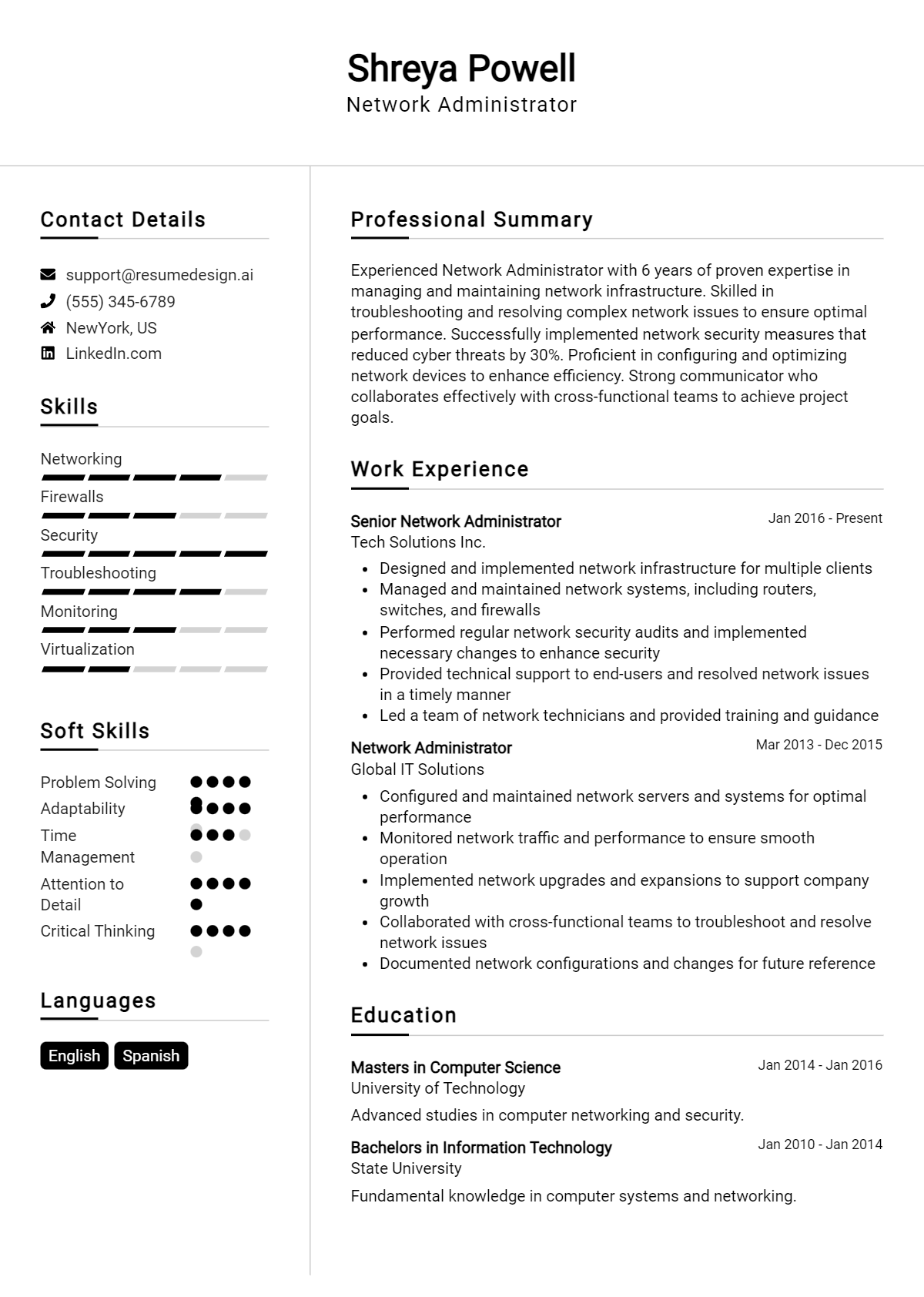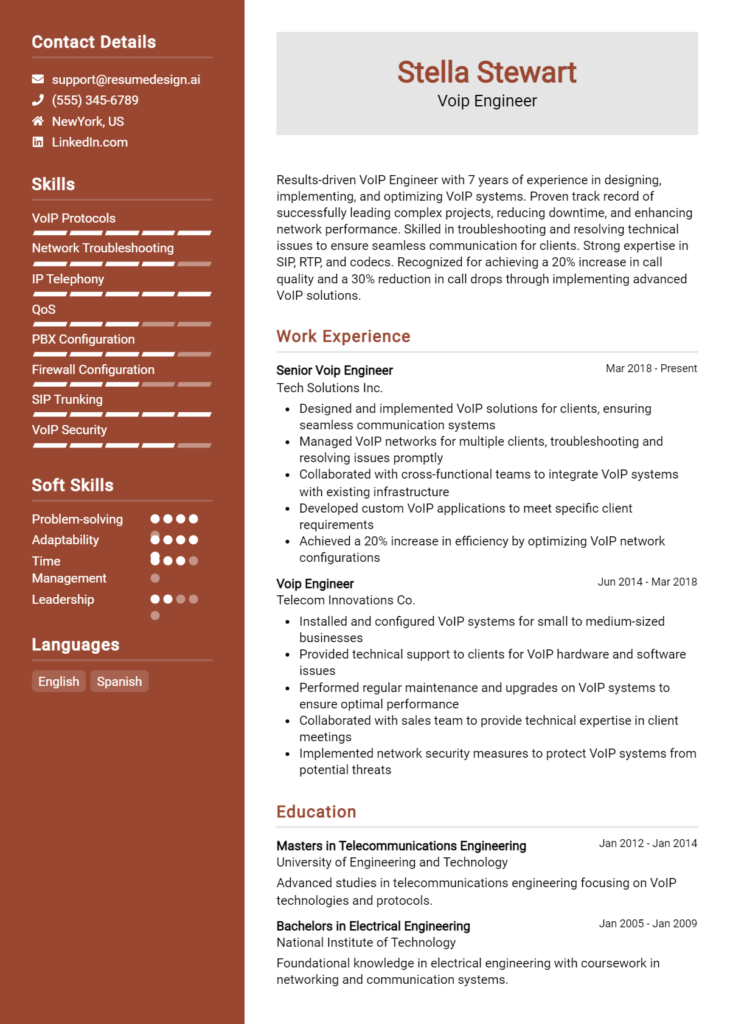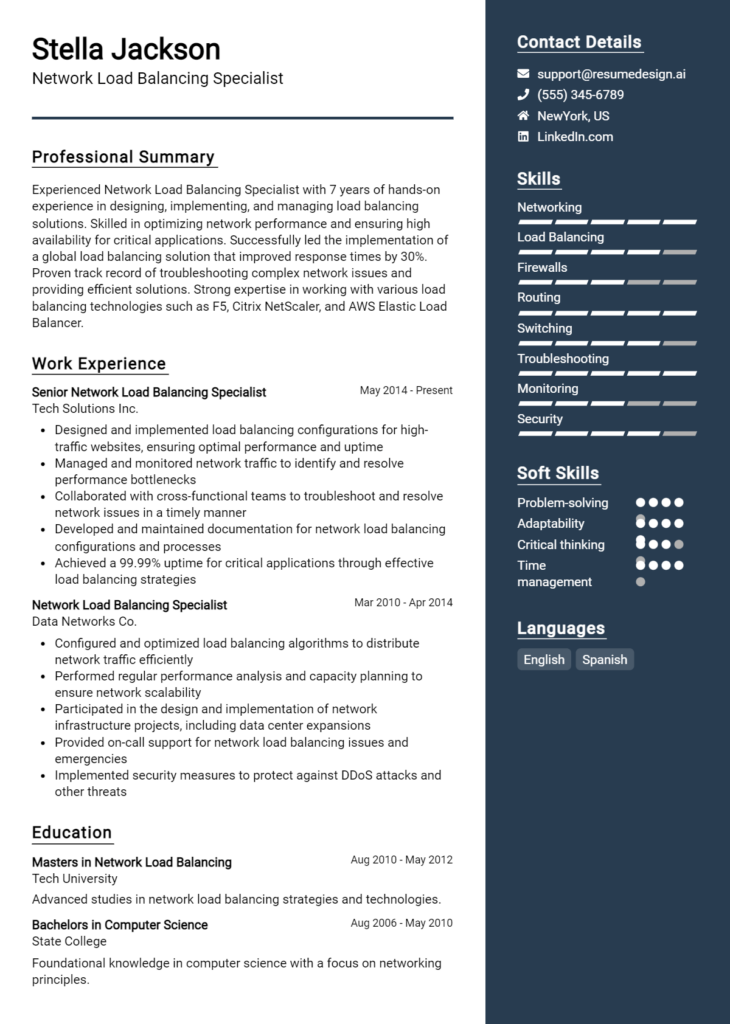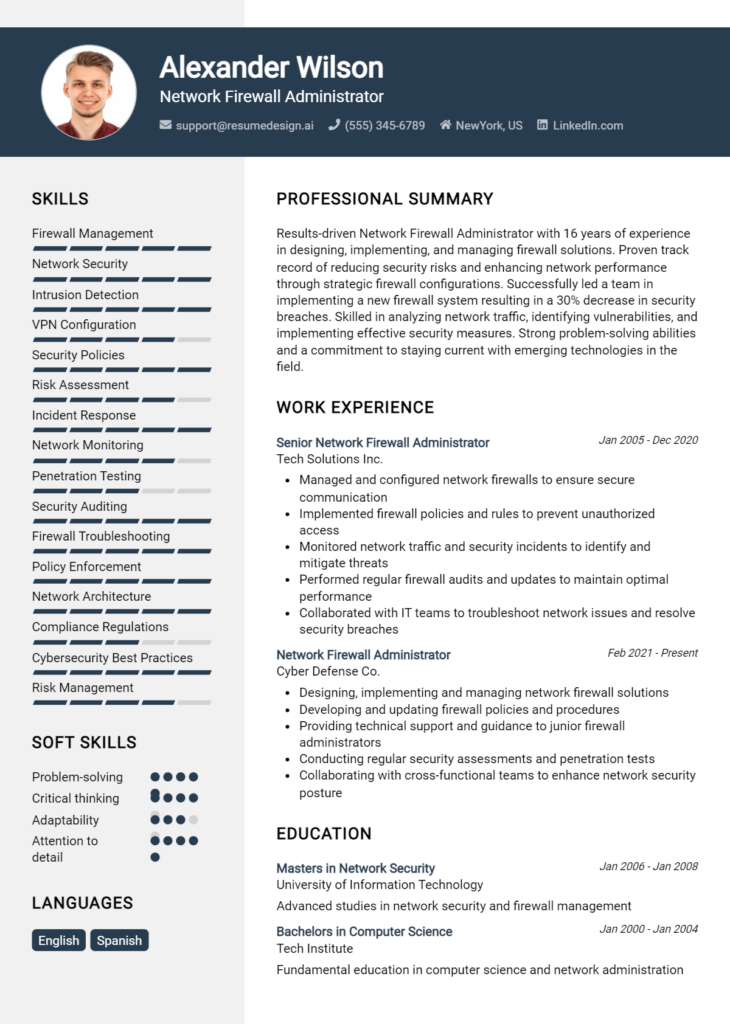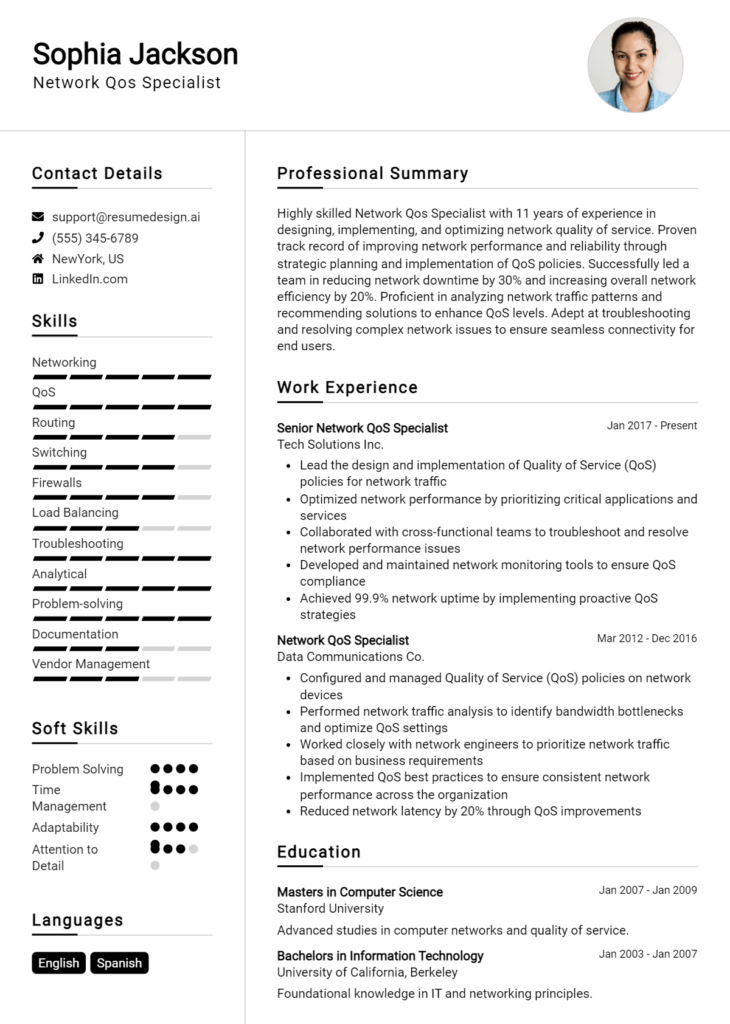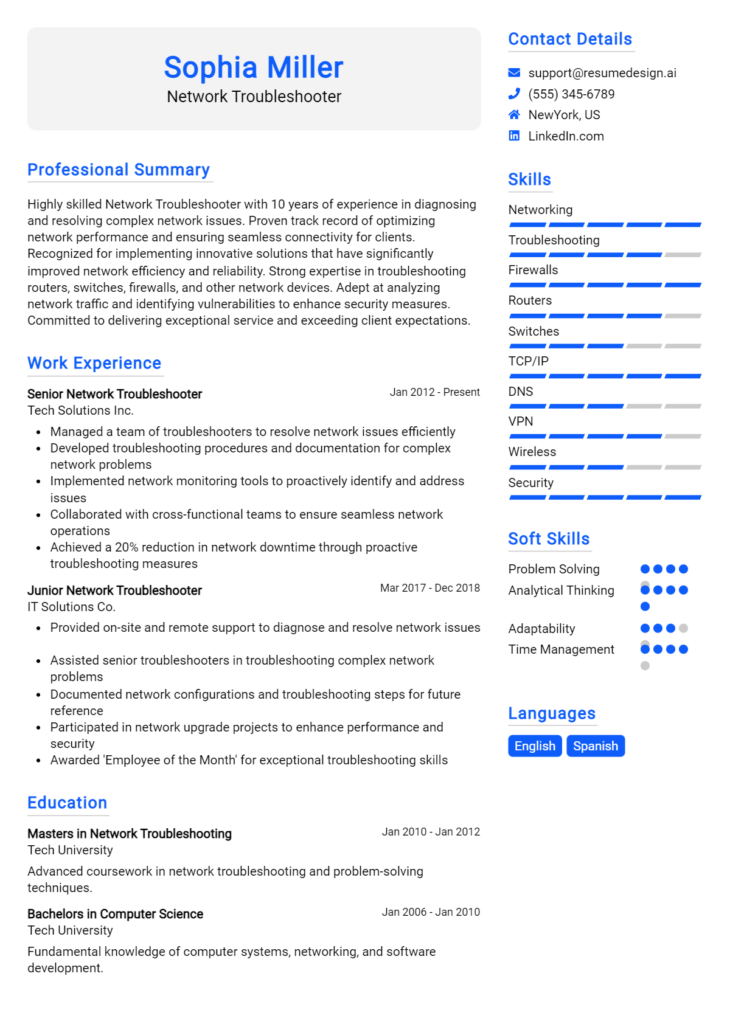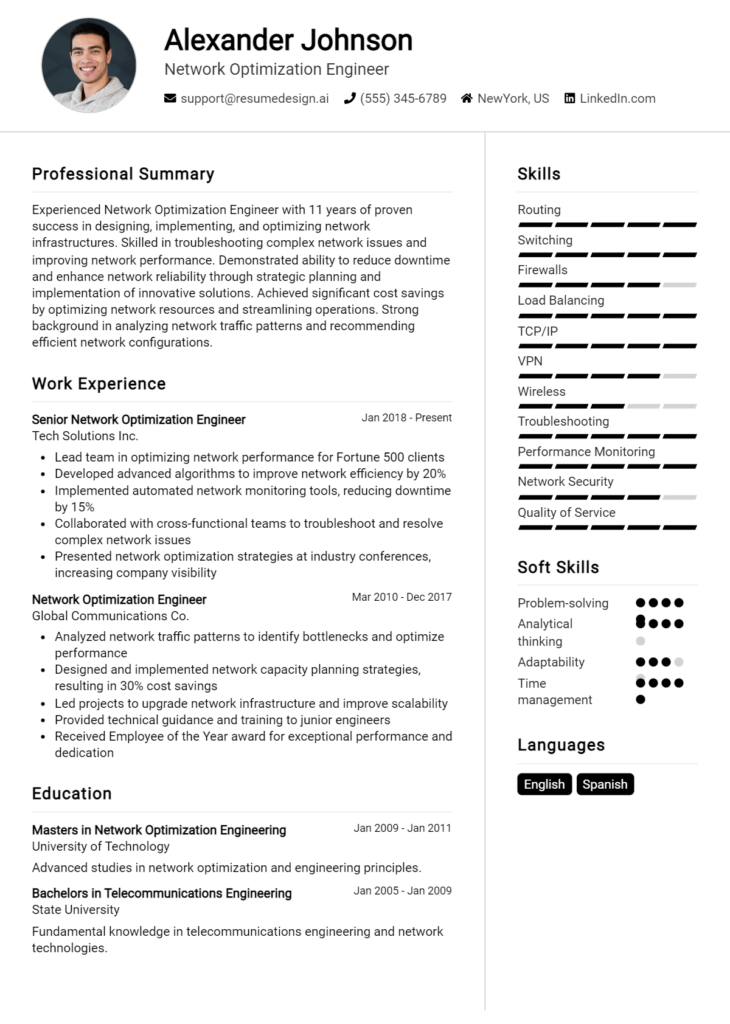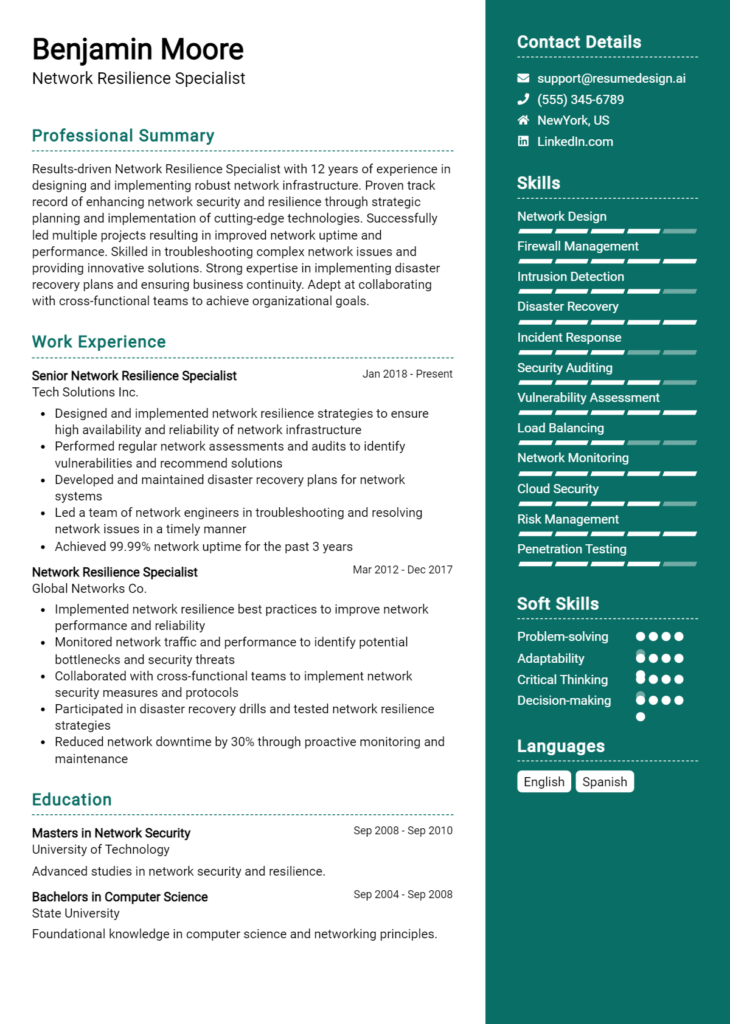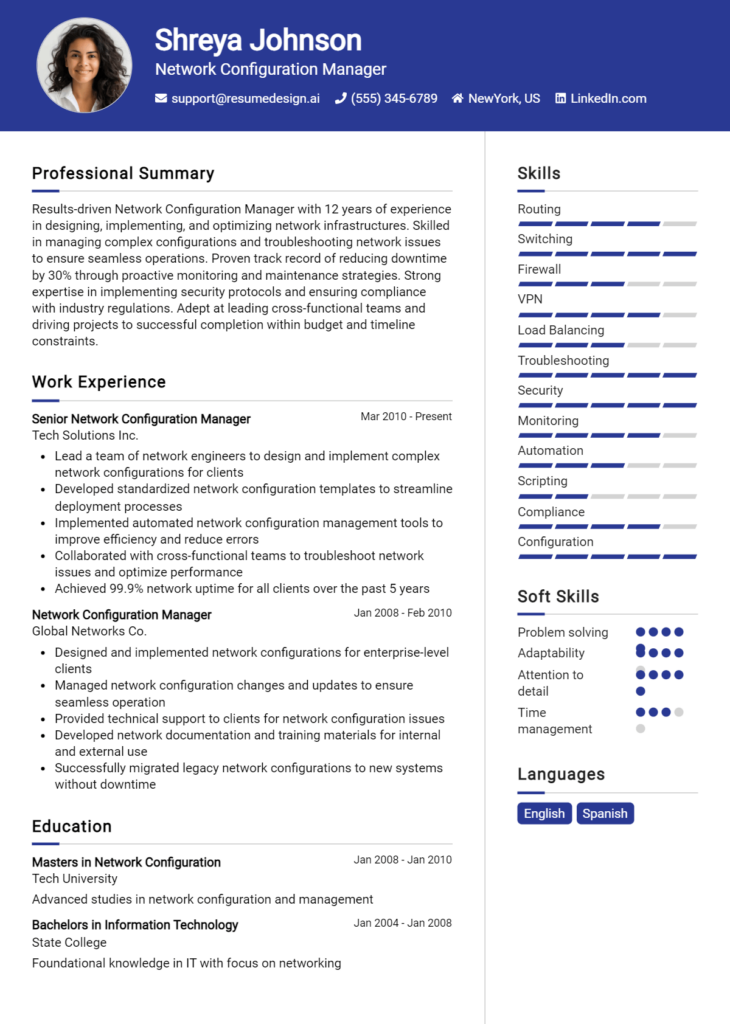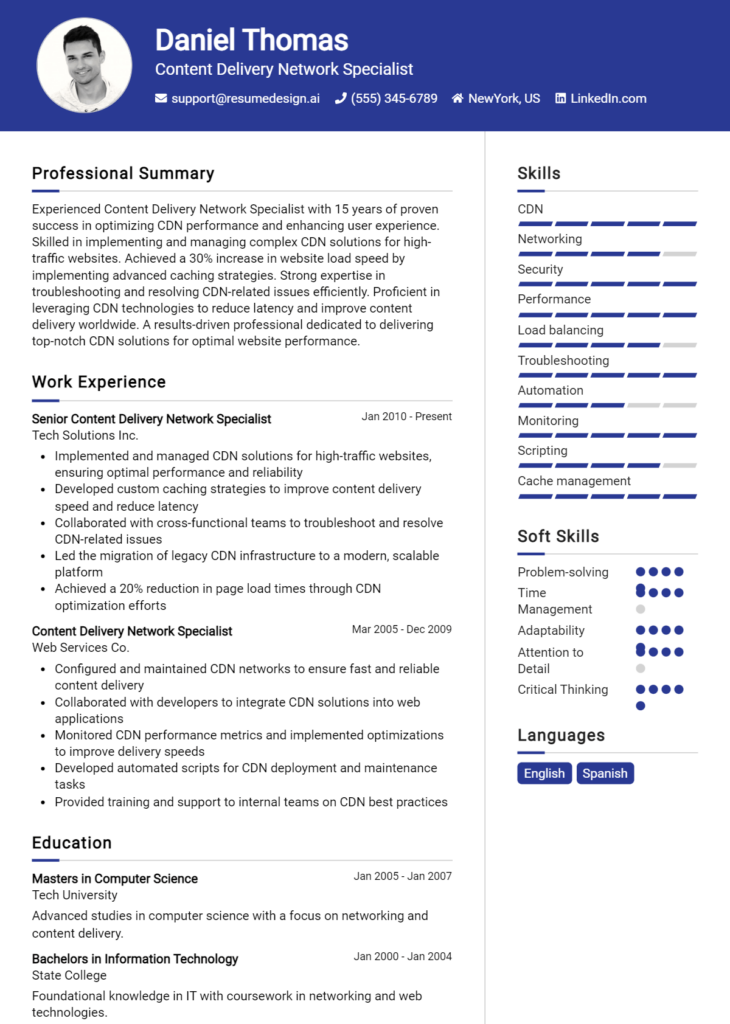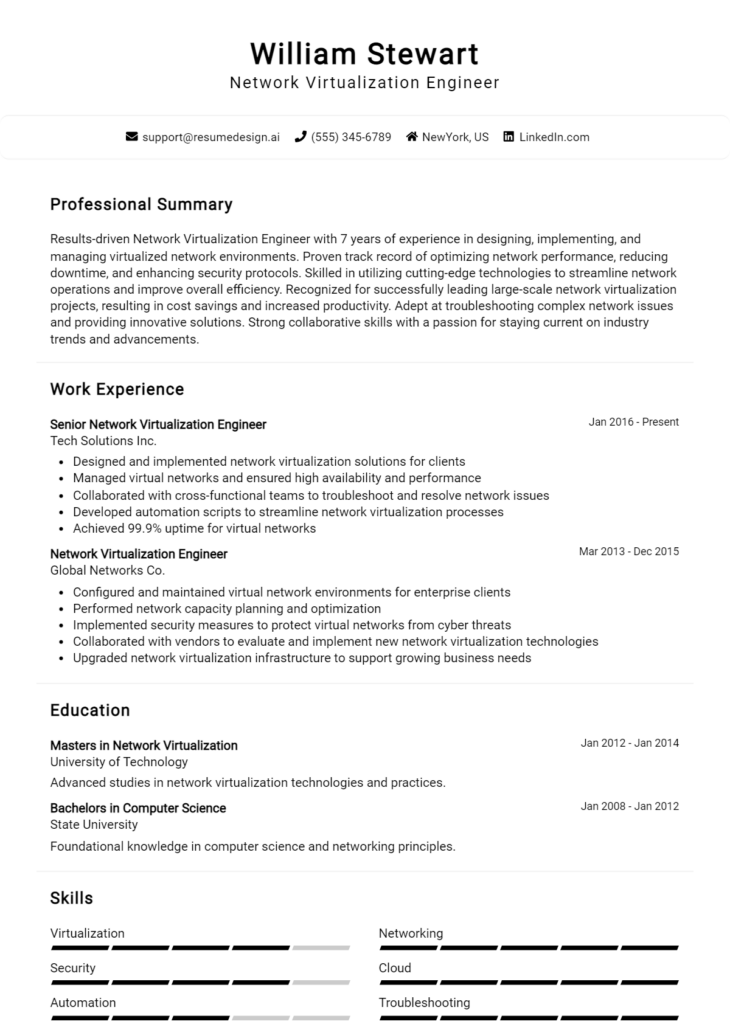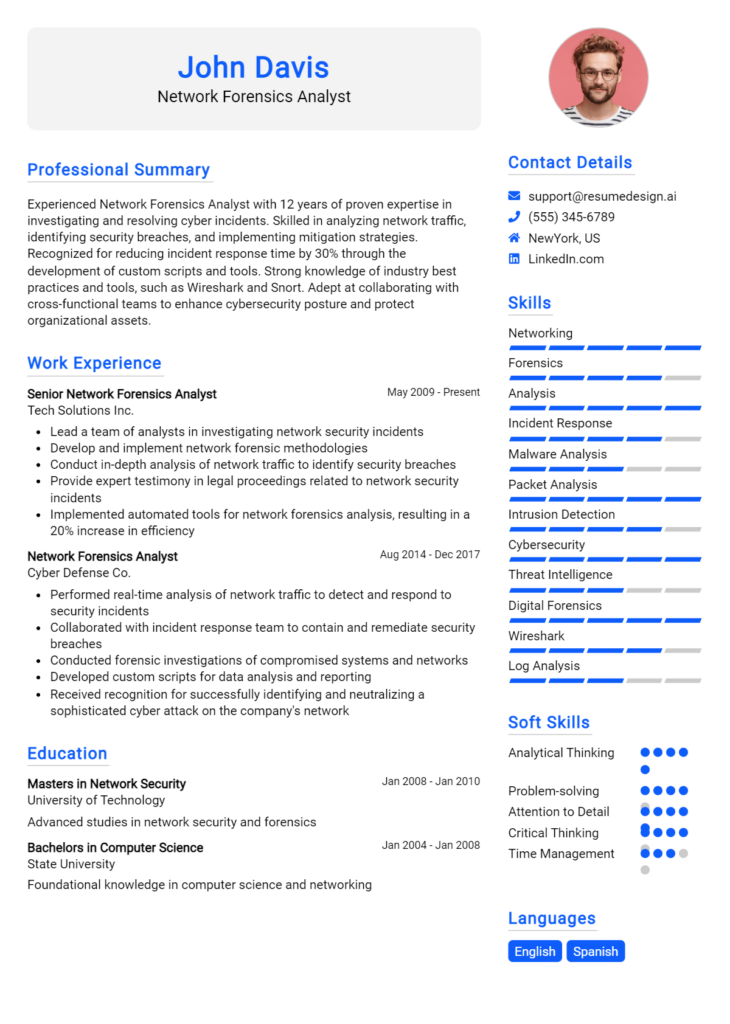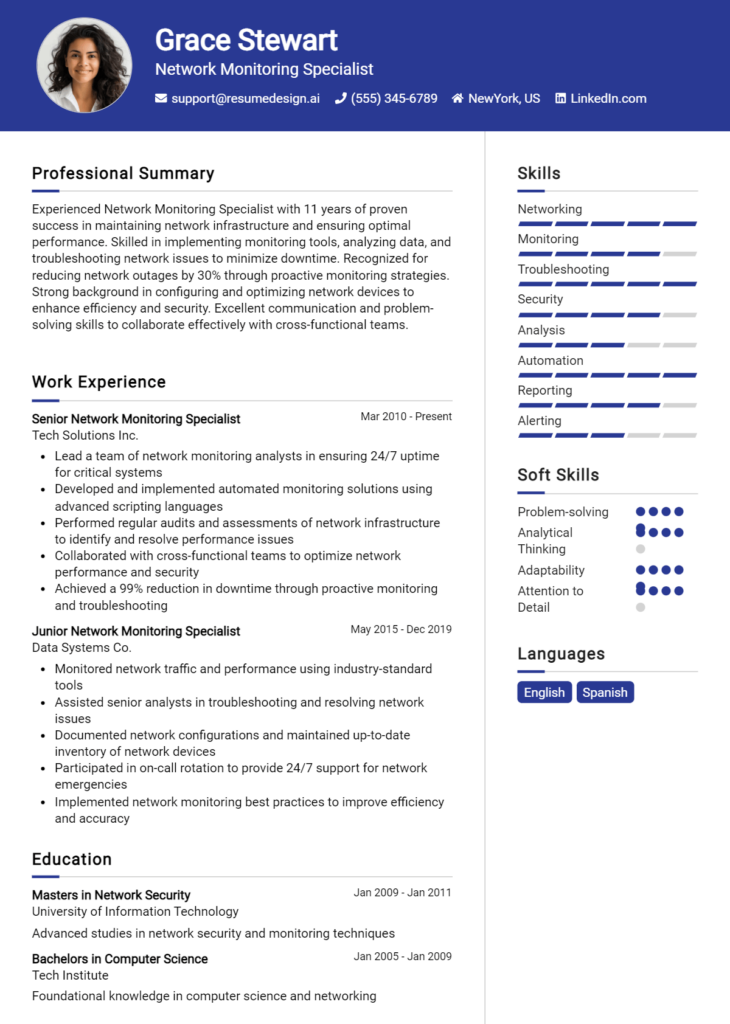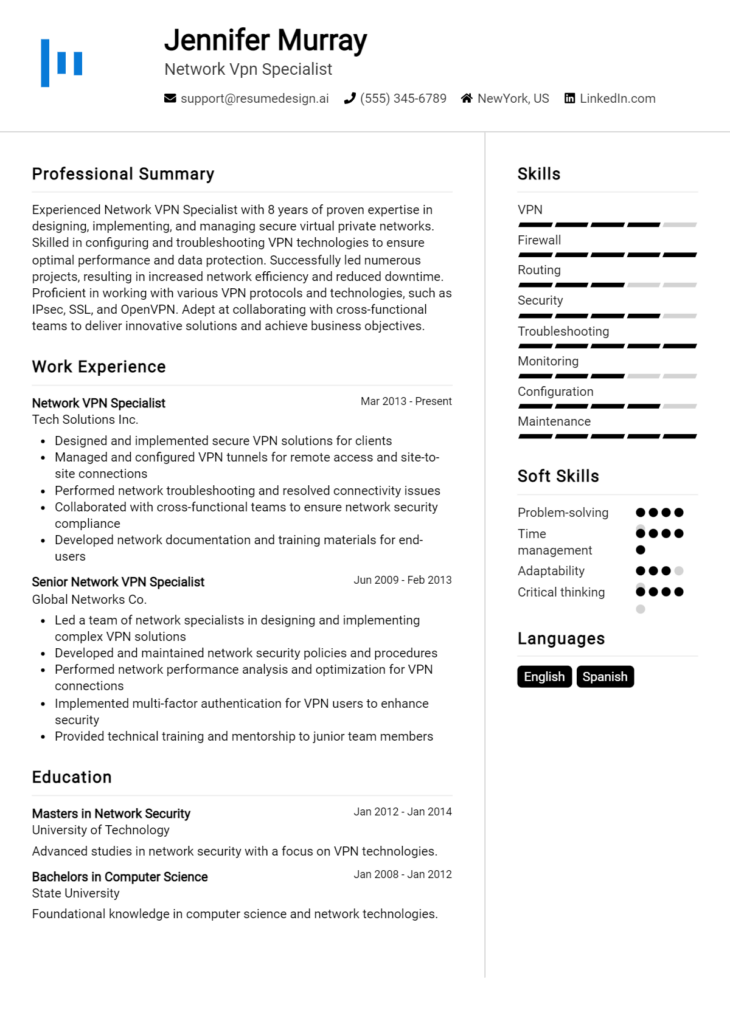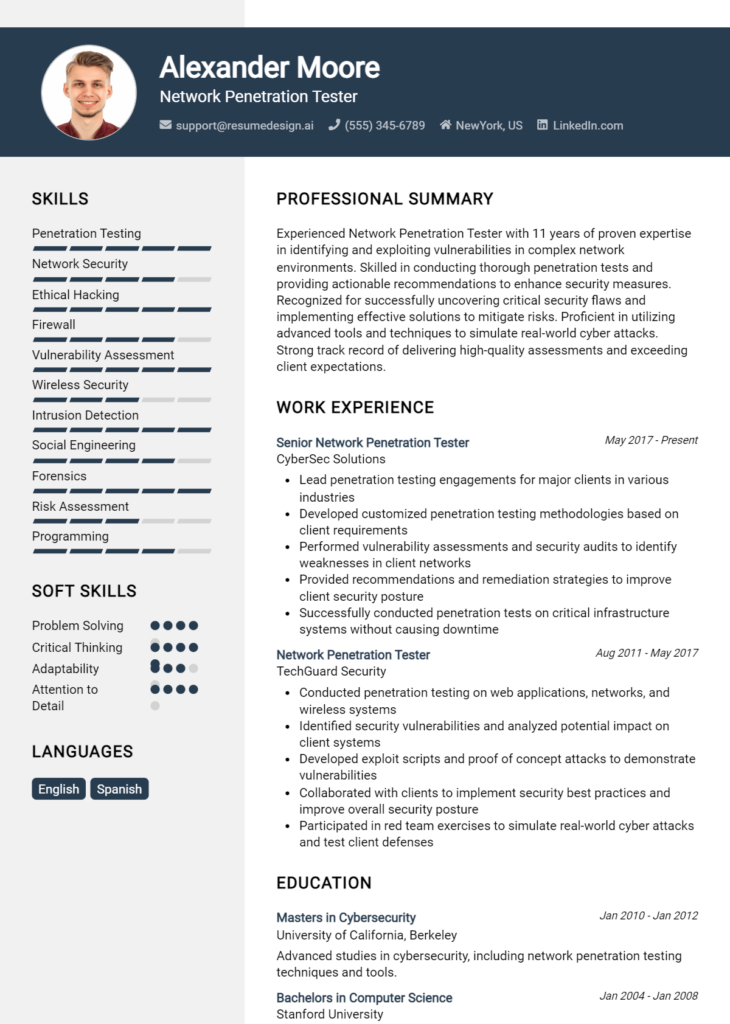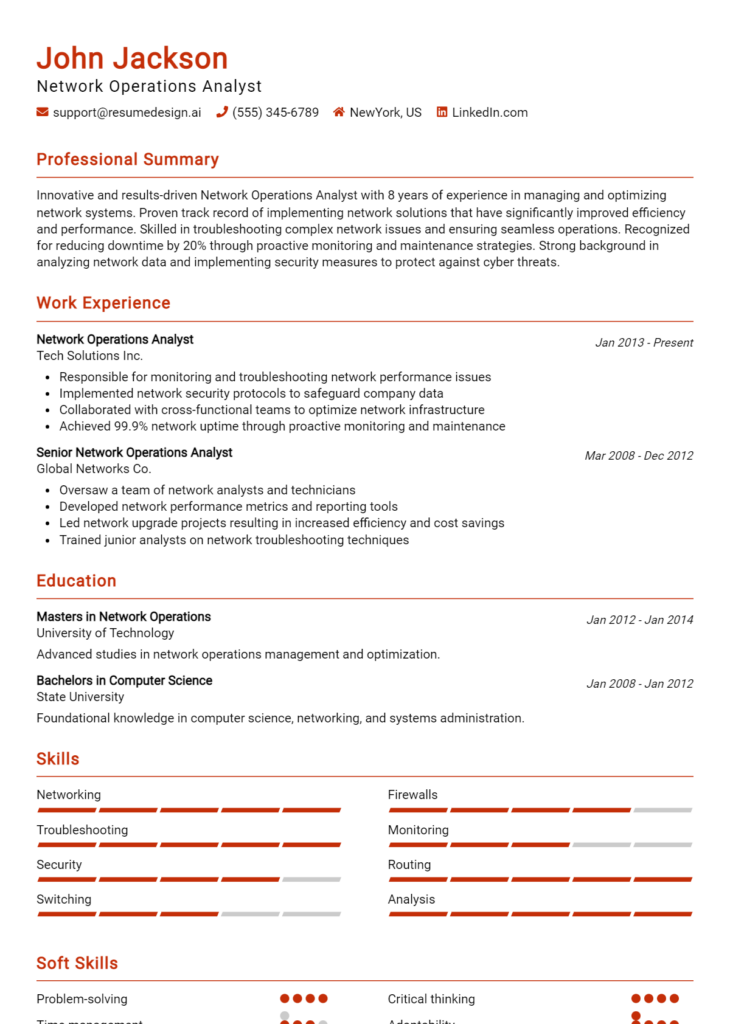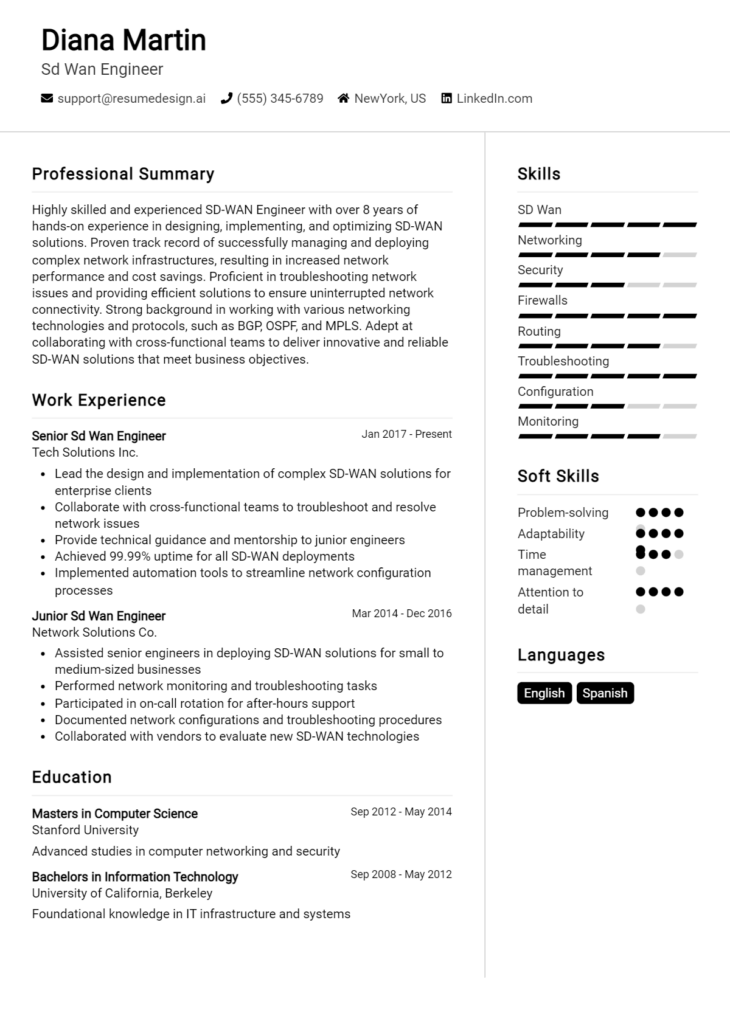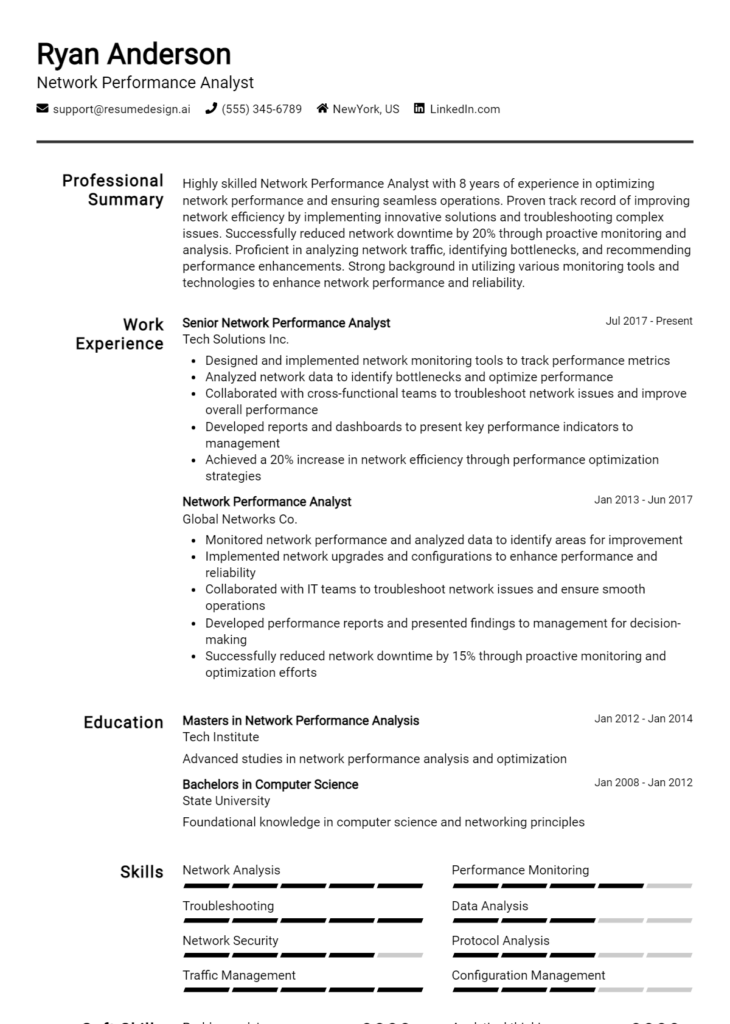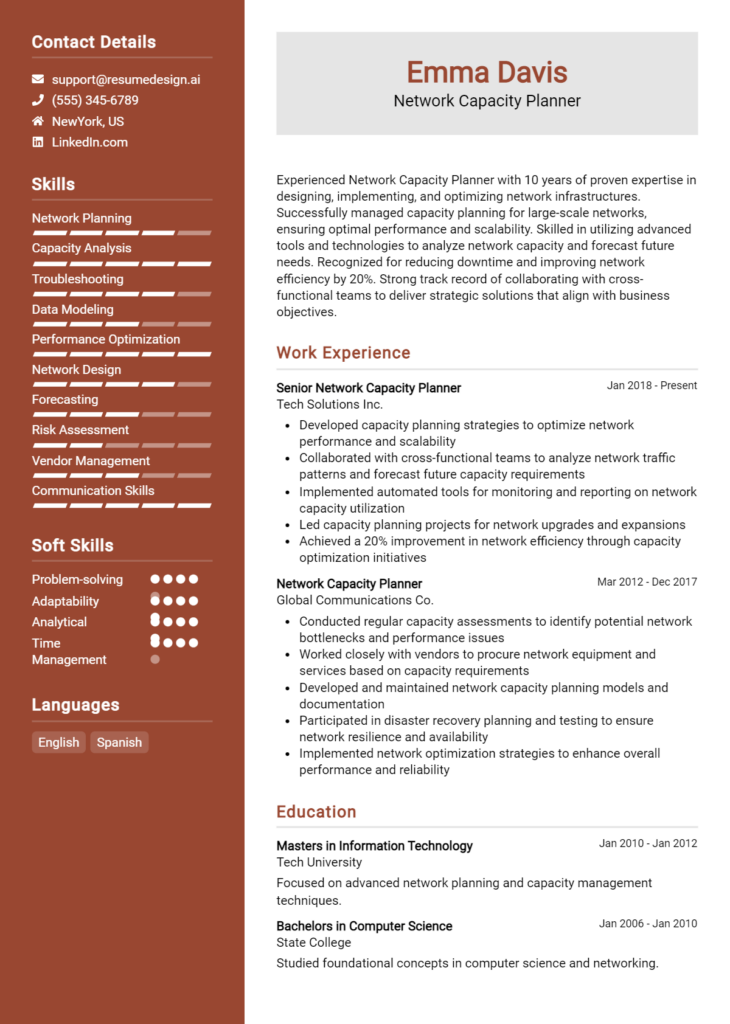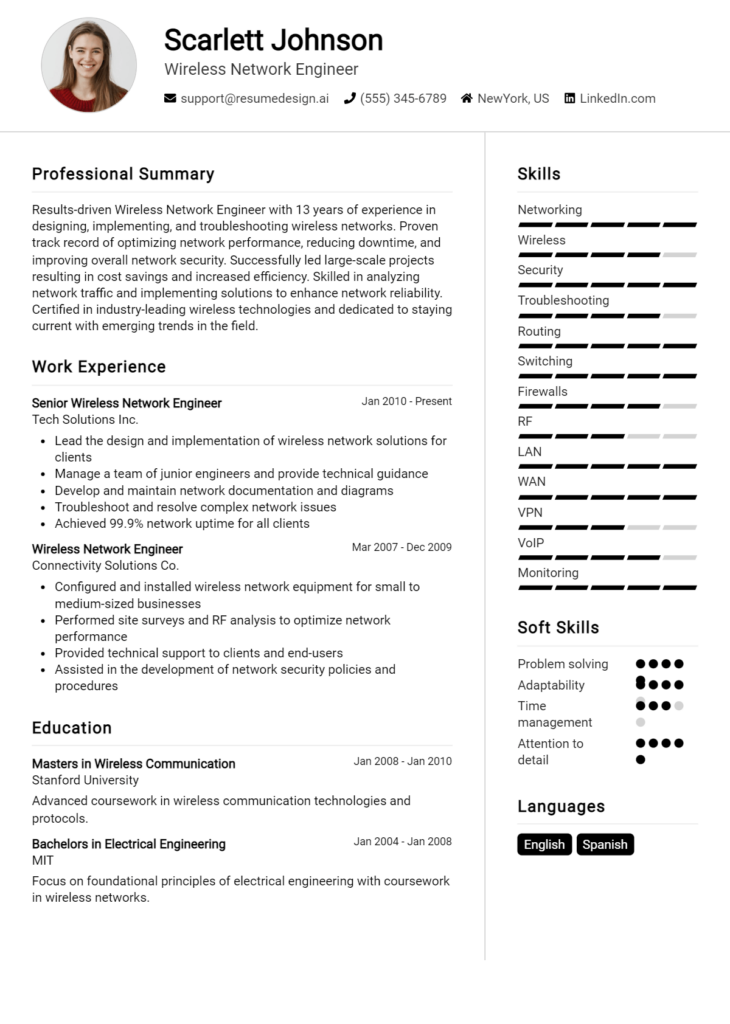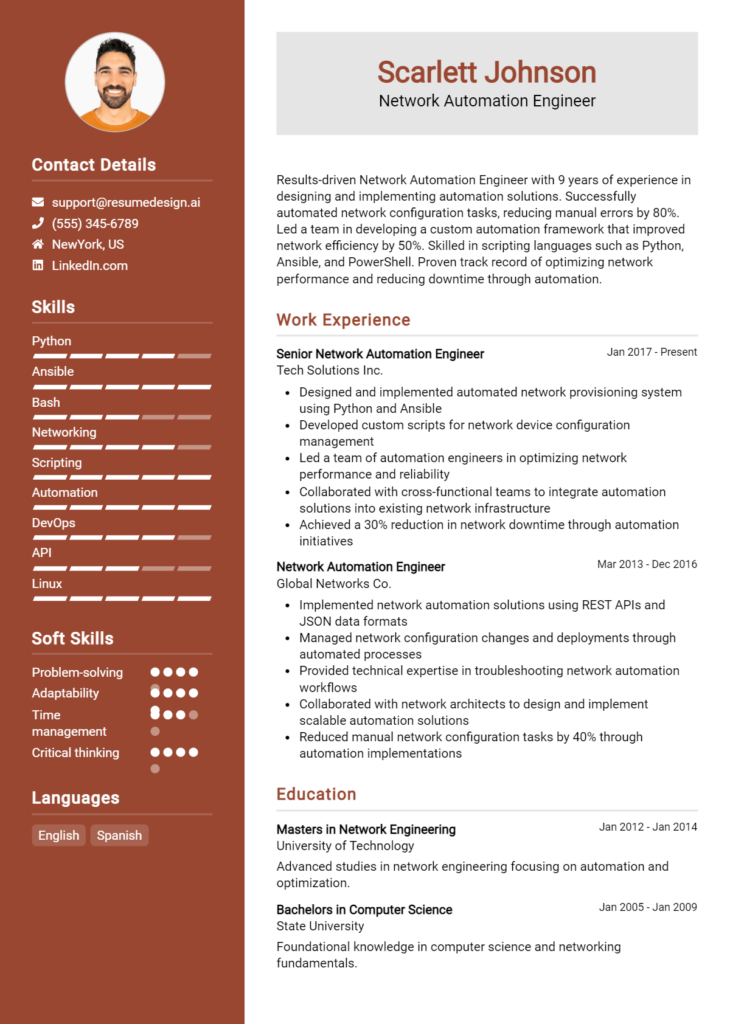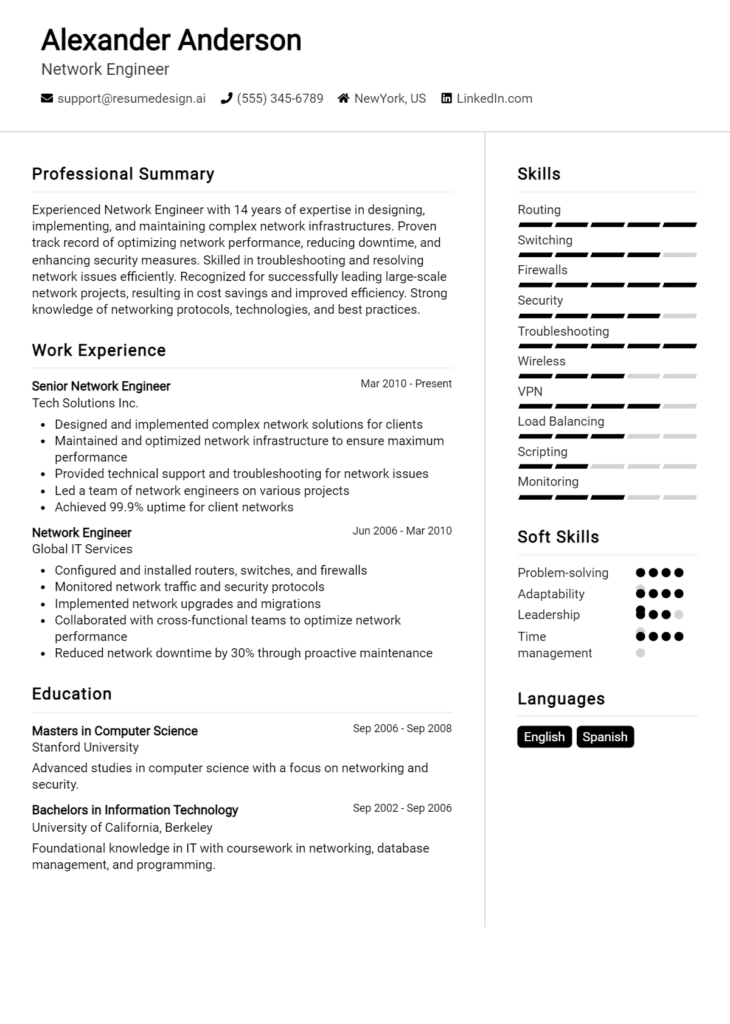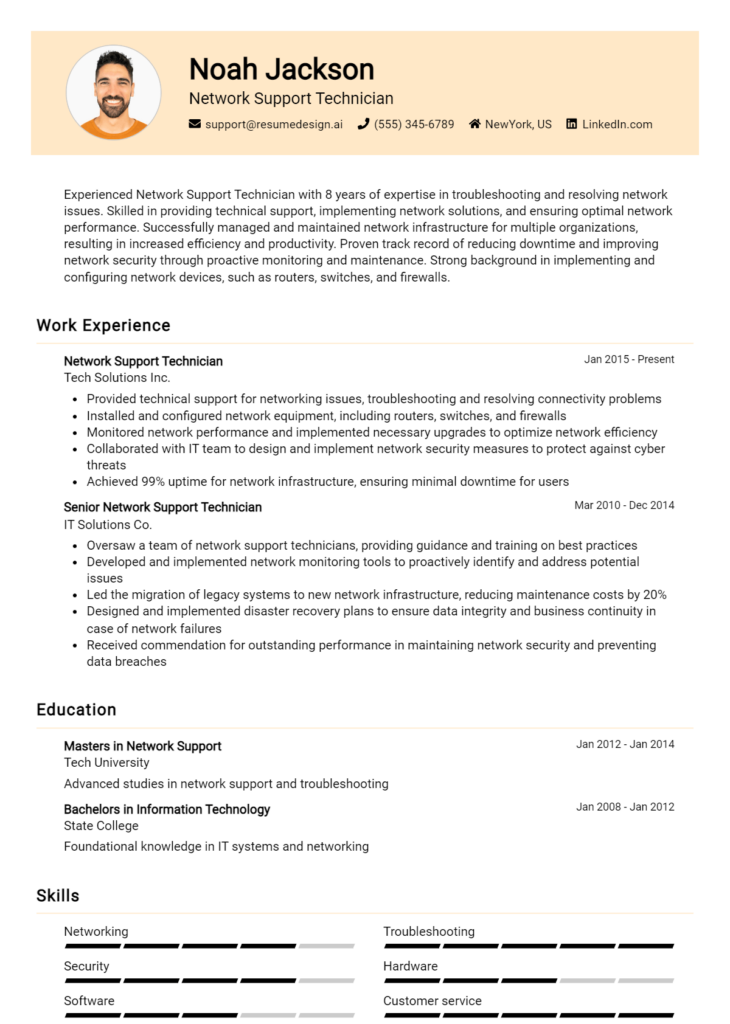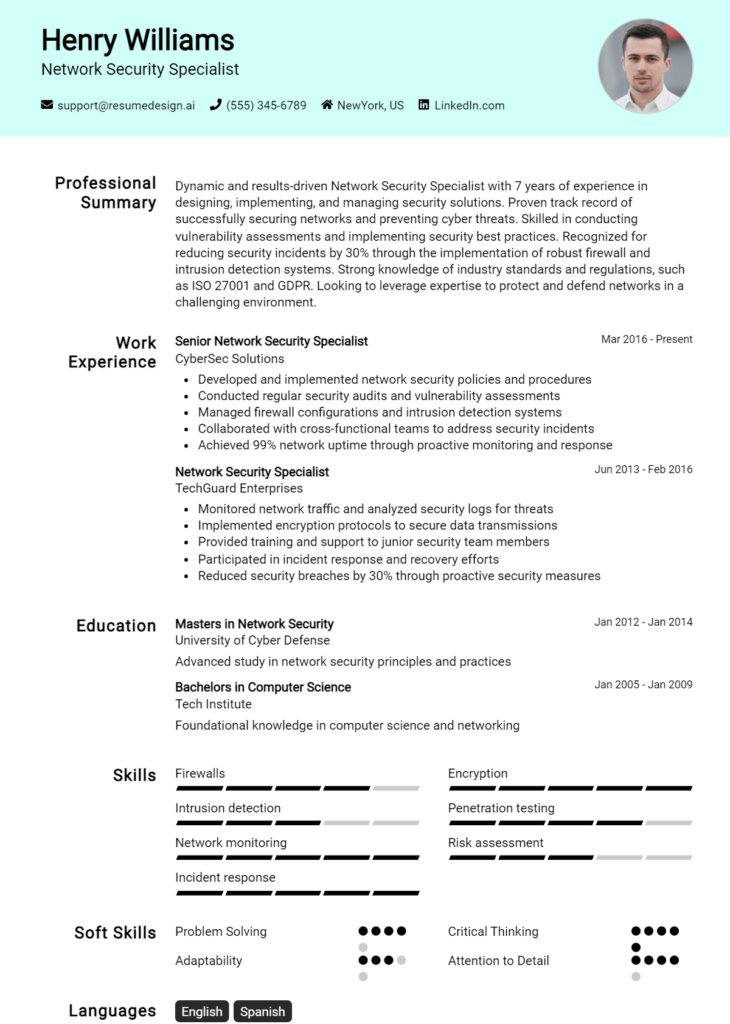Network Administrator Core Responsibilities
A Network Administrator plays a crucial role in maintaining an organization's IT infrastructure by managing network systems and ensuring seamless connectivity across departments. Key responsibilities include configuring, monitoring, and troubleshooting network devices, as well as implementing security measures to protect data integrity. Essential skills encompass technical proficiency, operational understanding, and strong problem-solving capabilities, which collectively support organizational goals. A well-structured resume effectively highlights these qualifications, showcasing a candidate's ability to facilitate collaboration and optimize network performance.
Common Responsibilities Listed on Network Administrator Resume
- Designing and implementing network configurations.
- Monitoring network performance and troubleshooting issues.
- Ensuring network security through firewalls and encryption.
- Performing regular system backups and recovery procedures.
- Maintaining documentation of network configurations and updates.
- Installing and configuring network hardware and software.
- Collaborating with IT teams to support organizational technology needs.
- Conducting network assessments to identify and resolve vulnerabilities.
- Providing technical support to end-users and staff.
- Staying updated on industry trends and emerging technologies.
- Training staff on network-related issues and best practices.
High-Level Resume Tips for Network Administrator Professionals
In today's competitive job market, a well-crafted resume is essential for Network Administrator professionals looking to make a lasting impression on potential employers. Often serving as the first point of contact between a candidate and an employer, your resume needs to effectively showcase not only your technical skills but also your notable achievements in the field. A strong resume can open doors to interviews and opportunities, ensuring that your qualifications align with the demands of the role. This guide will provide practical and actionable resume tips specifically tailored for Network Administrator professionals, helping you to stand out in a crowded applicant pool.
Top Resume Tips for Network Administrator Professionals
- Tailor your resume to each job description by incorporating relevant keywords and phrases.
- Highlight your technical skills, such as proficiency in network configuration, troubleshooting, and security protocols.
- Showcase your relevant experience in previous roles, detailing specific responsibilities and projects.
- Quantify your achievements wherever possible, using metrics to illustrate your impact (e.g., reduced downtime by X%, managed a network of Y devices).
- Include certifications that are relevant to the field, such as CompTIA Network+, CCNA, or Certified Information Systems Security Professional (CISSP).
- Emphasize your ability to work collaboratively with IT teams and other departments to enhance network performance.
- Incorporate soft skills such as problem-solving, communication, and project management that are essential for effective network administration.
- Utilize a clean, professional format that makes it easy for hiring managers to quickly identify your qualifications.
- Keep your resume concise, ideally one page, focusing on the most relevant information that aligns with the job you are applying for.
By implementing these tips, you can significantly increase your chances of landing a job in the Network Administrator field. A thoughtfully crafted resume that highlights your skills and achievements will not only showcase your qualifications but also demonstrate your commitment to professionalism in the industry, setting you apart from other candidates.
Why Resume Headlines & Titles are Important for Network Administrator
In the competitive field of network administration, a well-crafted resume headline or title serves as a crucial first impression for job seekers. It is the first piece of information that hiring managers encounter, and a strong headline can immediately capture their attention while summarizing a candidate's core qualifications in a concise and impactful manner. A compelling headline not only highlights relevant skills and experiences but also aligns with the specific job being applied for, making it an essential element of a successful resume. By ensuring that the headline is concise and directly relevant, candidates can significantly increase their chances of standing out in a crowded job market.
Best Practices for Crafting Resume Headlines for Network Administrator
- Keep it concise: Aim for one impactful phrase that encapsulates your expertise.
- Be role-specific: Tailor your headline to the Network Administrator position you are applying for.
- Highlight key skills: Include essential technical skills relevant to network administration.
- Use impactful language: Choose strong verbs and adjectives that convey confidence and competence.
- Include certifications: Mention relevant certifications that can set you apart from the competition.
- Focus on achievements: If possible, hint at measurable achievements that demonstrate your capabilities.
- Avoid jargon: Use clear language that is easily understood by hiring managers.
- Stay professional: Maintain a professional tone that reflects your career aspirations.
Example Resume Headlines for Network Administrator
Strong Resume Headlines
"Certified Network Administrator with 5+ Years of Experience in Enterprise-Level Systems"
"Proficient in Network Security and Infrastructure Optimization for High-Performance Networks"
"Results-Driven Network Specialist with Proven Track Record in Reducing Downtime by 30%"
Weak Resume Headlines
"Network Administrator Looking for a Job"
"IT Professional with Various Skills"
The strong headlines are effective because they not only highlight specific qualifications and achievements but also utilize language that conveys a sense of purpose and expertise. They are tailored to the role and offer insights into the candidate's professional strengths, making them appealing to hiring managers. Conversely, the weak headlines fall short due to their vagueness and lack of specificity, failing to provide any meaningful information about the candidate's qualifications, thereby blending into a sea of generic resumes.
Writing an Exceptional Network Administrator Resume Summary
A resume summary is a crucial component for a Network Administrator's resume, serving as the first impression for hiring managers who often have limited time to review each application. A strong summary quickly captures attention by effectively highlighting key skills, relevant experience, and specific accomplishments that align with the job role. It should be concise yet impactful, delivering a snapshot of the candidate's qualifications tailored to the specific position they are applying for. This focused approach not only showcases the candidate's technical expertise but also establishes their value proposition, making them stand out in a competitive job market.
Best Practices for Writing a Network Administrator Resume Summary
- Quantify Achievements: Use numbers and metrics to demonstrate the impact of your work.
- Focus on Key Skills: Highlight essential technical skills that are relevant to the job description.
- Tailor Your Summary: Customize the summary for the specific job to show alignment with the employer's needs.
- Be Concise: Keep it brief, ideally within 2-4 sentences, while ensuring it covers the most relevant points.
- Use Action Verbs: Start sentences with strong action verbs to convey a sense of proactivity and accomplishment.
- Highlight Relevant Certifications: Mention any industry certifications that strengthen your candidacy.
- Showcase Soft Skills: Include interpersonal skills that are important for team collaboration and communication.
- Avoid Jargon: Use clear language that is easily understood, avoiding overly technical jargon that may confuse the reader.
Example Network Administrator Resume Summaries
Strong Resume Summaries
Detail-oriented Network Administrator with over 5 years of experience managing complex network infrastructures. Successfully reduced downtime by 30% through proactive monitoring and maintenance of systems, leading to improved operational efficiency.
Results-driven IT professional with expertise in configuring and managing Cisco routers and switches. Achieved a 40% increase in network performance by implementing advanced routing protocols and optimizing bandwidth utilization.
Dedicated Network Administrator with a proven track record of enhancing network security protocols, resulting in a 50% decrease in successful cyber attacks. Holds CCNA and CompTIA Security+ certifications.
Skilled in troubleshooting and resolving network issues, with a history of supporting over 300 users in a corporate environment. Reduced average ticket resolution time by 25% through effective problem-solving and communication.
Weak Resume Summaries
Experienced Network Administrator looking for a new opportunity to use my skills.
Dedicated IT professional with a background in network management and support.
Network Administrator with some experience in various IT tasks.
The strong resume summaries are considered effective because they provide specific accomplishments, quantify results, and directly relate to the skills and experiences relevant to the Network Administrator role. In contrast, the weak summaries are vague, lacking measurable achievements and failing to convey the candidate's unique qualifications or the value they can bring to a potential employer. By being more specific and results-oriented, the strong examples demonstrate a clear understanding of the responsibilities and expectations for the position.
Work Experience Section for Network Administrator Resume
The work experience section of a Network Administrator resume is crucial in demonstrating a candidate's ability to manage complex networking tasks and lead teams effectively. This section not only highlights technical skills, such as proficiency in network configuration, troubleshooting, and security protocols but also showcases the candidate's ability to collaborate with cross-functional teams to deliver high-quality IT solutions. By quantifying achievements and aligning experiences with industry standards, candidates can present a compelling narrative that sets them apart in a competitive job market.
Best Practices for Network Administrator Work Experience
- Highlight relevant technical skills specific to network administration, such as experience with firewalls, routers, and network monitoring tools.
- Use metrics to quantify achievements, such as reduced downtime by X% or managed networks of X users.
- Demonstrate leadership capabilities by showcasing team management and project oversight experiences.
- Align your experiences with industry standards and best practices to demonstrate your knowledge of current trends.
- Include specific examples of collaborative projects that required cross-departmental cooperation.
- Focus on problem-solving experiences that illustrate your ability to troubleshoot and resolve network issues effectively.
- Tailor your work experience to match the job description for each application, emphasizing relevant roles and responsibilities.
- Utilize action verbs to describe your contributions and impact within previous roles.
Example Work Experiences for Network Administrator
Strong Experiences
- Led a team of 5 network engineers to successfully implement a company-wide network upgrade, resulting in a 30% increase in system performance and a 20% reduction in operational costs.
- Designed and deployed a secure VPN solution for remote workers, enhancing data protection and increasing remote access reliability by 50%.
- Managed a high-availability network for a 2,000-user organization, achieving 99.9% uptime and ensuring seamless business operations across multiple locations.
- Collaborated with the cybersecurity team to develop and implement a comprehensive security policy, reducing potential security breaches by 40% over two years.
Weak Experiences
- Worked on network-related tasks in previous jobs.
- Assisted in troubleshooting network issues occasionally.
- Participated in team meetings about network projects.
- Helped with the installation of network equipment at some point.
The examples categorized as strong demonstrate specific, quantifiable outcomes and leadership roles that reflect a candidate's technical acumen and collaborative skills. In contrast, the weak examples lack detail and measurable impact, making them less compelling to potential employers. Strong experiences clearly illustrate the candidate's contributions and achievements, whereas weak experiences fail to convey a sense of responsibility or effectiveness in the role.
Education and Certifications Section for Network Administrator Resume
The education and certifications section of a Network Administrator resume is crucial as it showcases the candidate's academic foundation and professional qualifications. This section not only emphasizes the formal education in relevant fields such as computer science or information technology but also highlights industry-recognized certifications that validate the candidate's expertise. Continuous learning is essential in the ever-evolving field of network administration, and including relevant coursework, certifications, and specialized training can significantly enhance a candidate's credibility, demonstrating their commitment to staying updated with the latest technologies and practices. Providing a well-structured education and certifications section can align the candidate's qualifications with the demands of the job role, making them a more attractive prospect to potential employers.
Best Practices for Network Administrator Education and Certifications
- Include only relevant degrees and certifications that pertain to network administration or IT.
- Highlight advanced or industry-recognized certifications, such as CCNA, CCNP, or CompTIA Network+.
- Provide details on specialized training courses that enhance your qualifications.
- Maintain a clear and concise format for easy readability.
- List the most recent education and certifications first to highlight ongoing professional development.
- Include any coursework that is directly applicable to network administration tasks.
- Avoid including outdated certifications that are no longer recognized in the industry.
- Consider adding GPA or honors if they are impressive and relevant to the position.
Example Education and Certifications for Network Administrator
Strong Examples
- Bachelor of Science in Computer Science, XYZ University, 2021
- CCNA (Cisco Certified Network Associate), Cisco, 2022
- CompTIA Network+, CompTIA, 2023
- Advanced Network Security Training, ABC Institute, 2023
Weak Examples
- Associate Degree in Arts, Community College, 2018
- Old Microsoft Certified Professional (MCP), Microsoft, 2015
- High School Diploma, Local High School, 2016
- Basic Computer Skills Course, Online Provider, 2019
The strong examples listed demonstrate relevant educational qualifications and industry-recognized certifications that directly align with the demands of a Network Administrator role. They reflect a focused approach to learning and professional development that appeals to employers. In contrast, the weak examples include irrelevant educational backgrounds and outdated certifications that do not pertain to current network administration practices, which can detract from the candidate's perceived expertise and suitability for the position.
Top Skills & Keywords for Network Administrator Resume
In the competitive field of network administration, a well-crafted resume is crucial for showcasing your qualifications and standing out to potential employers. Highlighting both hard and soft skills effectively communicates your technical prowess and interpersonal abilities, which are essential for managing complex network systems and collaborating with team members. Employers look for candidates who not only possess the necessary technical knowledge but also exhibit strong communication, problem-solving, and adaptability skills. By strategically incorporating these skills into your resume, you can demonstrate your capability to thrive in a dynamic work environment and contribute to the overall success of the organization.
Top Hard & Soft Skills for Network Administrator
Soft Skills
- Communication
- Problem-solving
- Time management
- Team collaboration
- Adaptability
- Attention to detail
- Critical thinking
- Customer service orientation
- Conflict resolution
- Project management
- Analytical skills
- Creativity
- Patience
- Organizational skills
- Interpersonal skills
Hard Skills
- Network configuration and troubleshooting
- Firewall management
- Virtual Private Networks (VPNs)
- Routing and switching protocols (e.g., OSPF, BGP)
- Network monitoring tools (e.g., Wireshark, SolarWinds)
- Server management (Windows/Linux)
- Cloud services (AWS, Azure)
- Security protocols (e.g., SSL, IPsec)
- LAN/WAN design and implementation
- Wireless networking
- Network performance optimization
- Backup and disaster recovery solutions
- Scripting languages (e.g., Python, Bash)
- Active Directory management
- VoIP technology
- IPv4/IPv6 addressing
- Network documentation and reporting
For more information on how to effectively showcase your skills and work experience, consider exploring additional resources that can enhance your resume.
Stand Out with a Winning Network Administrator Cover Letter
Dear Hiring Manager,
I am excited to apply for the Network Administrator position at [Company Name] as advertised on [Job Board/Company Website]. With a solid background in managing and maintaining network infrastructures, along with proven expertise in troubleshooting complex issues, I am confident in my ability to contribute effectively to your team. My hands-on experience with various networking technologies and my commitment to ensuring optimal performance and security make me an ideal candidate for this role.
In my previous position at [Previous Company Name], I successfully managed a multi-site network environment, overseeing the installation, configuration, and maintenance of routers, switches, and firewalls. I implemented proactive monitoring solutions that reduced downtime by 30% and enhanced overall network performance. Additionally, I led initiatives to upgrade our network security protocols, which resulted in a significant decrease in vulnerabilities and improved compliance with industry standards. My ability to collaborate with cross-functional teams allowed me to develop tailored solutions that aligned with organizational goals and user requirements.
I hold a [Degree/Certification] in [Relevant Field], and I am continually seeking to expand my knowledge in emerging technologies and best practices in network administration. I am particularly drawn to [Company Name] because of its commitment to innovation and excellence in [Industry/Field]. I am eager to bring my technical skills, problem-solving abilities, and passion for network management to your esteemed organization. I look forward to the opportunity to discuss how my experience and vision align with the goals of your team.
Thank you for considering my application. I am excited about the prospect of contributing to [Company Name] and am looking forward to the chance to discuss my qualifications further.
Sincerely,
[Your Name]
[Your LinkedIn Profile]
[Your Contact Information]
Common Mistakes to Avoid in a Network Administrator Resume
When crafting a resume for a Network Administrator position, it’s crucial to present your skills and experiences in a way that stands out to potential employers. However, many candidates make common mistakes that can undermine their chances of securing an interview. Understanding these pitfalls can help you create a polished and effective resume that highlights your qualifications and expertise in network management.
Vague Job Descriptions: Failing to provide specific details about previous roles can make it difficult for employers to gauge your expertise. Instead, use quantifiable metrics and examples of your accomplishments.
Ignoring Keywords: Many companies utilize applicant tracking systems (ATS) that scan resumes for specific keywords related to the job description. Neglecting to incorporate these keywords can lead to your resume being overlooked.
Overloading with Technical Jargon: While it’s important to showcase your technical skills, using excessive jargon can alienate hiring managers who may not be familiar with every term. Aim for a balance that is accessible yet informative.
Lack of Tailoring: Sending out a generic resume for all applications can be detrimental. Tailor your resume to highlight experiences and skills that are most relevant to each specific job.
Neglecting Soft Skills: Technical expertise is vital for a Network Administrator, but soft skills like problem-solving, communication, and teamwork are equally important. Ensure these skills are evident in your resume.
Poor Formatting: A cluttered or confusing layout can detract from the content of your resume. Use clear headings, bullet points, and consistent formatting to enhance readability.
Not Including Certifications: Network Administration often requires specific certifications (e.g., CCNA, CompTIA Network+). Failing to include these can make your resume less appealing to employers looking for qualified candidates.
Typos and Grammatical Errors: Simple mistakes can create a negative impression, signaling a lack of attention to detail. Always proofread your resume multiple times or enlist a friend to review it before submission.
Conclusion
As a Network Administrator, your role is pivotal in ensuring the seamless operation of an organization’s network infrastructure. Key responsibilities include monitoring network performance, managing security protocols, troubleshooting issues, and implementing upgrades to improve system efficiency. Staying updated with the latest technologies and best practices in networking is crucial for success in this dynamic field.
In addition to technical skills, strong analytical and problem-solving abilities are essential. Communication skills also play a vital role, as Network Administrators often collaborate with other IT professionals and end-users to resolve issues and enhance system performance.
To summarize, being a successful Network Administrator requires a balance of technical knowledge, practical experience, and effective communication skills. With the competitive nature of the job market, ensuring your resume reflects these competencies is more important than ever.
Now is the perfect time to review and refine your Network Administrator resume. Consider utilizing resources such as resume templates, a resume builder, and resume examples to craft a standout application. Additionally, enhance your chances of making a great first impression with professional cover letter templates. Take action today to elevate your career prospects!

